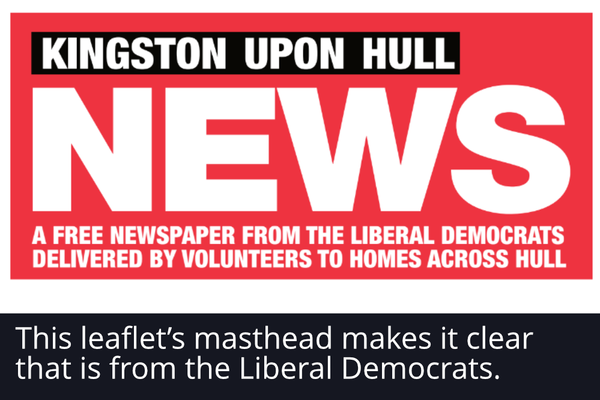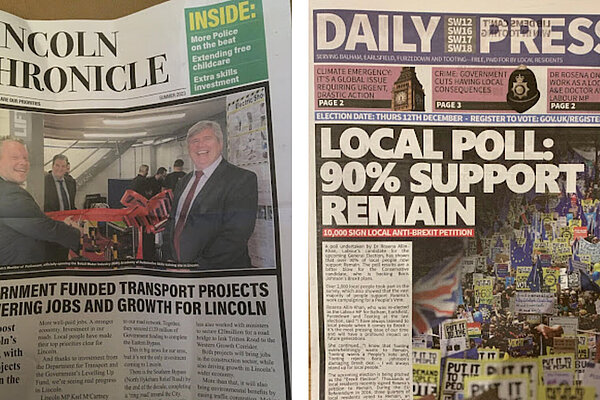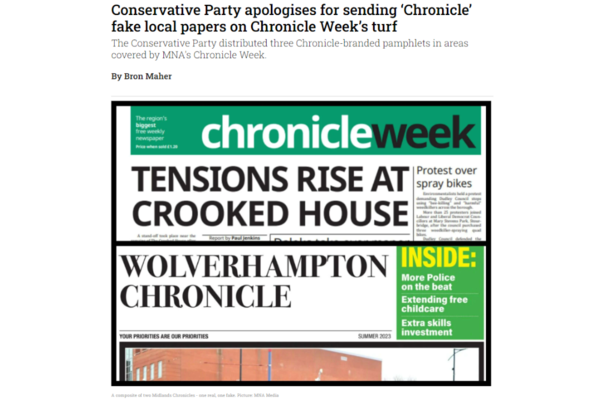Fighting a Fair Election
In a year which sees a massive set of elections across the country and abroad, we recognise the need to ensure that in an increasingly volatile environment, all political parties run fair and honest campaigns.
An Electoral Commission Report into campaigning in the 2019 General Election said: “Voters were concerned about the use of misleading campaign techniques by campaigners from across the political spectrum.”
While this Conservative Government has created a crisis for democracy in our country with their sleaze and scandal, we’re determined to do our bit to make sure politics is fair and works for ordinary people.
We’re leading the way in making ‘tabloid’ leaflets clearer
Tabloid newspapers are an effective way of communicating with people and have been used by all political parties for decades. We know that different people take in information in different formats, tabloids often reach people that different designs don’t. In many parts of the country, the Lib Dem tabloid format is a well-established and trusted local brand in its own right.

We are also aware that the use of the tabloid format by political parties must be done in an appropriate way, and as a result, we are setting out guidance to all of our Local Parties.
For some time we have been asking Lib Dem campaigners across the country to make sure all tabloid leaflets are clearly identifiable as being from and paid for by the Liberal Democrats on the front page. Lib Dem campaigners will find all the HQ-produced templates provided on the party’s internal Campaign Hub do this, and, we ask that local parties stick to this guidance.
Why is this different and what does the law require?
The law only requires political parties to use small election imprints on literature. By clearly marking tabloid leaflets as being from the Liberal Democrats in a clearly visible way on the front page, we are committed to leading the way on transparency in politics and going above and beyond the legal requirement.
To uphold local journalism and avoid confusion among residents, we’re asking our campaigners to also avoid giving tabloids titles that could be confused with any similar local newspapers. This is an area where the Conservatives have fallen foul previously.
Every main political party uses this form of leaflet
Each of the main political parties uses this style of leaflet.
The Conservatives have recently sent out tabloid leaflets around the country, during the last general election Labour used the format and as mentioned the Liberal Democrats do too.

What’s important is that all political parties make sure that any tabloid campaigning literature is clearly labelled. That is why we’ve issued strict guidance on this and are calling on the other parties to follow suit by sending out similar guidelines to their campaigners ahead of the next election.
Big tech and the online shift are killing local newspapers, not political leaflets
There is no question local print journalism is under fire. More than 320 local newspaper titles closed between 2009 and 2019, a trend likely to have been accelerated by the COVID-19 pandemic. (DCMS Select Committee on Sustainability of Local Journalism)
But it’s not accurate to claim that these leaflets, which are produced by all major parties, are contributing to the demise of local print journalism.
In all of this, it’s important to look at the facts behind the decline of local print journalism.
The DCMS Select Committee Report, the Charitable Journalism Project and even the NMA themselves all cite big tech, social media and the shift to online journalism as the major contributors to online journalism’s decline.
- In 2020, the Competition and Markets Authority found that of the £14bn spent on digital advertising in the UK, 80% went to Google and Facebook, starving publishers of an important and traditional revenue stream.
- In the survey conducted by Yonder, nearly 90% of respondents said they received local news via any online source. Conversely, the print editions of local papers were used by 22% of respondents.
- Google has a more than 90% share of the UK search engine market, Meta’s platforms has a 73% share of social media market (Meta, Instagram, Whatsapp) as of 2022, according to HoC sustainability of local journalism report.
Media expert Professor Steven Barnett wrote: "the long-standing business model of print journalism is undermined by the flight of advertising revenue to online providers." In a separate piece, he added: “...the big tech companies – particularly Facebook and Google – are hoovering up local as well as national advertising revenues.”
Responding to the MPs' concerns about clickbait in a DCMS Select Committee meeting, Adam Cantwell-Corn (UCL) explained that it was the “economics of the advertising-driven model” and the power imbalance between publishers and Big Tech over the share of the advertising market.
With falling revenues, local news publishers are left with fewer resources to conduct effective journalism, and the quality of the stories they publish and their relevance to local communities can decline. The economics of digital advertising may contribute to this trend, as sensationalised news content designed to drive visits to a publisher’s website (“clickbait”) is incentivised to increase revenue. (DCMS Select Committee on Sustainability of Local Journalism)
Neither the DCMS Select Committee report nor Charitable Journalism Project reports that cover the decline of local print media mention party political leaflets as a contributor.
We have a plan to save local journalism and we want the other parties to join us
We are also calling for a real effort to support our local news institutions across Britain. Having a strong local media plays a critical role in holding all political parties to account. Liberal Democrats are fighting hard to protect local newspapers from the existential threat they face from big tech companies and the shift towards online news, and we will continue to support them.
In March 2022, the Liberal Democrats set out a policy paper on Democracy and Public Debate. The paper sets out extensive policy on supporting local journalism and the challenges the industry has faced in recent years. The party wants to fight the corner of local journalism and promote a diverse and high-quality news ecosystem.
Liberal Democrats will encourage improvement in the quality of the UK’s news and information provision, enhancing the quality of public debate, by:
- Requiring very large social media platforms to negotiate fair compensation to news providers whose content appears on their sites.
- Applying the same rules to online news outlets as traditional news providers.
- Funding local journalism and independent fact-checkers with a levy on very large social media platforms.
In the spirit of cross-party cooperation ahead of the elections coming up this year, we’re calling on every party to issue guidance to local teams to mark all tabloid literature with the political party name and join us in our calls to save local journalism.

